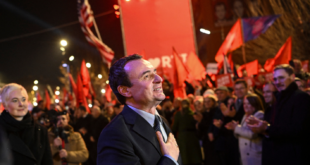BELGRADE
Coordinator of the Forum for Ethnic Relations, Dušan Janjić, said that visa liberalization is not possible for residents of Kosovo currently. He added that the reasons for this is that Serbia “has no control over the province”.
Commenting on Interior Minister Ivica Dačić’s statement that the government should adopt appropriate decisions related to issuing passports for Kosovo and Metohija residents, despite the stance of the European Commission the conditions for visa liberalization have not been met in Kosovo, Janjić said that it was clear as early as in June that the EC report on visa liberalization would not include the province.
He told Belgrade daily Borba that this applied to the citizens who had new Serbian passports and are living in Kosovo.
“Another problem are the archives and the documentation which were moved to [central] Serbia, so that there can be no checks run on whether these people live in Kosovo or not. For example, the documentation from Peć is currently located in Kragujevac,” he said.
As far as the protocol for cooperation with EULEX is concerned, he stated that Kosovo does not fulfill the conditions for visa liberalization and that the residents are controlled “neither by the Kosovo government nor by Belgrade”.
He said that the European Commission will once again in September look at whether Kosovo has fulfilled the four conditions for getting on the white Schengen list and if this happens, there is a chance that the European Commission “will admit that”.
“It is necessary to improve border control. The memorandum with EULEX solves only part of the problem, because [Kosovo police] KPS has the control. The question is whether the European Commission will accept such a state of affairs or ask for the signing of an agreement with KPS too,” Janjić said.
The memorandum, he continued, is one of the most important steps, “but it is also necessary to solve the problems such as cross-border crime and corruption as well”.
“If the two cases that recently occurred in Bujanovac and Preševo remain unsolved, that will make it harder for the European Commission to give a positive opinion,” Janjić said, referring to recent terrorist attacks in the south of Serbia.
He added that “it must be de facto admitted” that Serbia “has no control over Kosovo, that is, that there is a different government present in that territory”.
 Eurasia Press & News
Eurasia Press & News



